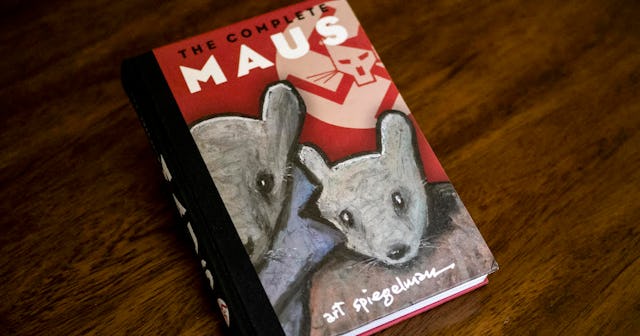Tennessee School Bans Classic Holocaust Graphic Novel ‘Maus’

The book’s celebrated author Art Spiegelman says that he’s ‘baffled’ by the ban
As part of an ongoing wave of book-banning across the country, a school board in Tennessee went ahead and banned the graphic novel Maus, a Pulitzer Prize-winning story written by Art Spiegelman about the Holocaust and its repercussions.
Specifically, the McMinn County School Board banned the book on January 10, though it didn’t make national news until this week after a tweet went viral. They objected to 8 swear words and one picture of a naked woman (portrayed in a non-sexual way).
The school board voted 10-0 to remove the book from the 8th grade curriculum.
This follows similar bans in places like Pennsylvania and Kansas, where — you guessed it — the vast majority of banned books are written by authors from marginalized groups and about hot-button topics like race, sexuality, and religion.
The book is a memoir that centers on Spiegelman’s father, who survived the Holocaust, as well as the fallout that followed all of the survivors, including Spiegelman’s mother, who died by suicide when he was 20 years old. In the book, Jewish characters are depicted as mice while the Nazis are depicted as cats.
The school board responded to the uproar with a statement.
“The graphic novel Maus from McMinn County Schools because of its unnecessary use of profanity and nudity and its depiction of violence and suicide. Taken as a whole the board felt this work was simply too adult-oriented for use in our schools.”
We’d like to quickly point out that books about the Holocaust should be pretty upsetting. That’s kind of the whole point.
The statement went on to say that they aren’t banning the book because it’s about a minority or about the Holocaust.
“We do not diminish the value of Maus as an impactful and meaningful piece of literature, nor do we dispute the importance of teaching our children the historical and moral lessons and realities of the Holocaust. To the contrary we have asked our administrators to find other works that accomplish the same educational goals in a more age appropriate fashion. The atrocities of the Holocaust were shameful beyond description, and we all have an obligation to ensure that younger generations learn of its horrors to ensure such an event is never repeated.”
But again: how do you learn about the mass murder of 6 million people in a way that’s not violent and uncomfortable? And how do kids realize the pain and generational trauma it caused without reading books written by people who were impacted by it?
According to the minutes of the meeting, one person had sense in the room, assistant principal Julie Goodin.
“I can talk of the history, I was a history teacher,” she said. “And there is nothing pretty about the Holocaust and for me this was a great way to depict a horrific time in history.”
It’s also suspicious that all of the recent book bans cite adult themes as a reason for the ban, while it’s becoming more and more obvious that the banned books are also all about getting marginalized voices heard.
The image of the naked woman that the board was offended by was of the author’s mother.
Spiegelman told NBC that he was “baffled” by the ban.
“It’s leaving me with my jaw open, like, What?” he told the news outlet.
“I’ve met so many young people who have learned things from my book,” he went on to say. “I also understand that Tennessee is obviously demented,” said Spiegelman. “There’s something going on very, very haywire there.”
The US Holocaust Museum also responded.
“Maus has played a vital role in educating about the Holocaust through sharing detailed and personal experiences of victims and survivors. On the eve of International #HolocaustRemembranceDay, it is more important than ever for students to learn this history,” they write. “Teaching about the Holocaust using books like Maus can inspire students to think critically about the past and their own roles and responsibilities today.”
Spiegelman said it more directly during an interview on CNN. “It has the breath of autocracy and fascism about it. I think of it as a harbinger of things to come.”
Book bans were up 67 percent, when comparing bans this fall with the number of bans last fall, according to NPR.
Maus is the only graphic novel ever to win a Pulitzer Prize.